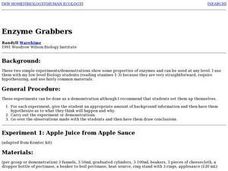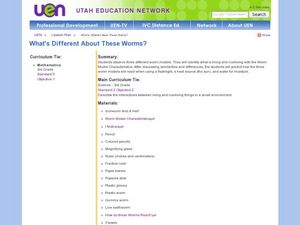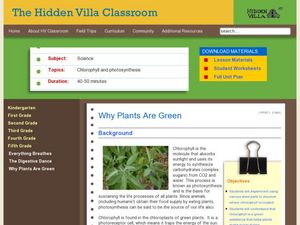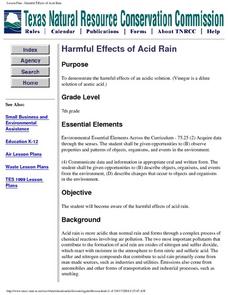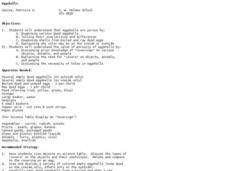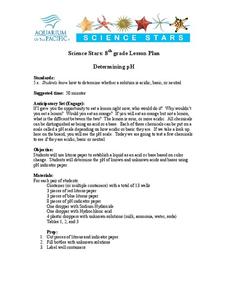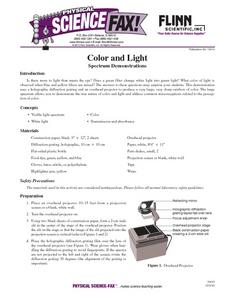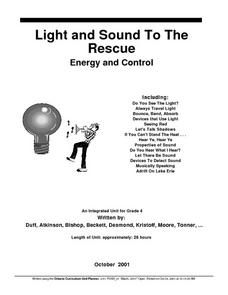Curated OER
Enzyme Grabbers
Students perform two experiments to show the properties of enzymes. They use pectinase to produce apple juice from applesauce to show enzyme action and then taste the difference between raw and boiled papaya seeds as evidence of enzyme...
Curated OER
It's The States of Matter
Students investigate the properties of solids, liquids and gases. In this states of matter lesson plan, students observe dry ice and its characteristics. They calculate the density of dry ice and observe the sublimation of the dry ice...
Curated OER
Three Worm Lesson
Third graders observe properties of three worms. In this living and non-living lesson, 3rd graders study characteristics of living and non-living worms. Students experiment to find how light, heat and moisture effects each of the worms....
Curated OER
Minerals Prime
In this minerals worksheet, students answer fifteen multiple choice questions about mineral formation, volcano and mountain formation, mineral tests and properties of minerals.
Curated OER
Why Plants Are Green
Students discover the properties of chlorophyll in plants. In this plant biology lesson, students conduct an experiment to find where the chlorophyll in the plant is located. Students are split into small groups and study plant parts....
Curated OER
The Discovery of OXygen
Students conduct experiments to identify the different properties of oxygen. For this chemistry lesson, students examine its importance to life on Earth. They explore the historic dispute about oxygen's discovery.
Curated OER
Harmful Effects of Acid Rain
Seventh graders are able to demonstrate the harmful effects of an acidic solution. They become aware of the harmful effects of acid rain. Students make predictions before they began the experiment. If vingegar contains acid, then how...
Curated OER
Oxidation and Salt
Students study the reaction on iron in water, air, and sodium chloride. They create a situation that shows this process and gives them the opportunity to hypothesize what, why, and how. They keep records and do an oral and written ...
Curated OER
A Potting We Will Go
Students read A Tree is Nice and It Could Still Be a Tree. For this tree planting lesson, students compare and contrast private property and common resources. Students identify the needs of a tree and follow the directions to plan a tree...
Curated OER
Do You Know Bamboo?
Students understand the properties of Bamboo and what it can be used for. In this bamboo lesson, students with bamboo and compare and contrast to wood. Students share their findings.
Curated OER
Eggshells
Students examine the porosity of eggshells. In this eggshell properties lesson, students observe dyed eggs, then peel the eggs to see if the color was able to go through the shell and discuss why eggshells have pores.
Curated OER
The Living Earth-Glaciers
Young scholars investigate glaciers. In this earth science lesson, students use sandy ice cubes to observe how glaciers change the land. Young scholars list forces that cause changes in the Earth's surface.
Curated OER
Concrete Research
Students explore concrete. In this physical science and computer research instructional activity, students work in groups to answer specific questions about concrete. Each group of students completes a different worksheet with a...
Curated OER
Magnets: They Are Totally Attractive
Students classify objects that magnets are attracted to and aren't attracted to. They also magnetize metal. They construct and use a compass. They develop a product which show they explain the properties of magnetism.
Curated OER
Somethin' Sweet
Students make their own candy. In this science lesson plan, students observe how molecules interact with each other in physical changes and observe how the addition of heat can cause molecules to interact and form new molecules in...
Curated OER
What's The Scoop?
Students explore the properties of matter. In this cross curriculum three states of matter science lesson, students listen to the poem "Eighteen Flavors" by Shel Silverstein, and predict what will happen if listed ingredients are...
Curated OER
Determining pH
Eighth graders explain the difference between acids, bases and neutral solutions. In this chemistry lesson, 8th graders describe the properties of each. They determine the pH of an unknown solution using the indicator paper and pH scale.
Rice University
What Should You Wear In Antarctica?
Students weigh various battings and feathers. They make sure to have the same weight of each type of insulations. Students wrap one bottle of warm water in each of the two insulations. They measure the temperature of each bottle,...
Curated OER
Color and Light Spectrum Demonstrations
Students explore the light spectrum. The teacher uses holographic diffraction grafting film on an overhead to demonstrate the true nature of color. After observing a vivid rainbow, students recognize that white light is composed of all...
Curated OER
Light And Sound To the Rescue
Fourth graders use the design process to construct devices that send distress signals through air and water for purposes of rescue. They construct devices that use light and sound to assist in nautical rescues and use the knowledge...
Curated OER
Penny and Cup Game
Students perform activities to discover if one eye is better than two. They test their sense of sight with both monocular and binocular vision. Students drop a penny and see if it lands in the cup of water. They rely on their sense of...
Curated OER
Bellwork for Week 5-Minerals and Experimental Design
In this minerals and experimental design worksheet, students answer questions about variables in experiments, identification of minerals, mining and properties of minerals.
Curated OER
Chemical Equilibrium
In this chemical equilibrium worksheet, students review hydration, dissociation, and colligative properties. Students also review Le Chatelier's principle. This worksheet has 15 short answer questions and 12 problems to solve.
Curated OER
Reviving Celery
The classic in-class demonstration using celery dipped into water with food coloring is the highlight of this biology lesson plan. Young scientists discover that organisms are made up cells and have distinguishing characteristics. After...


